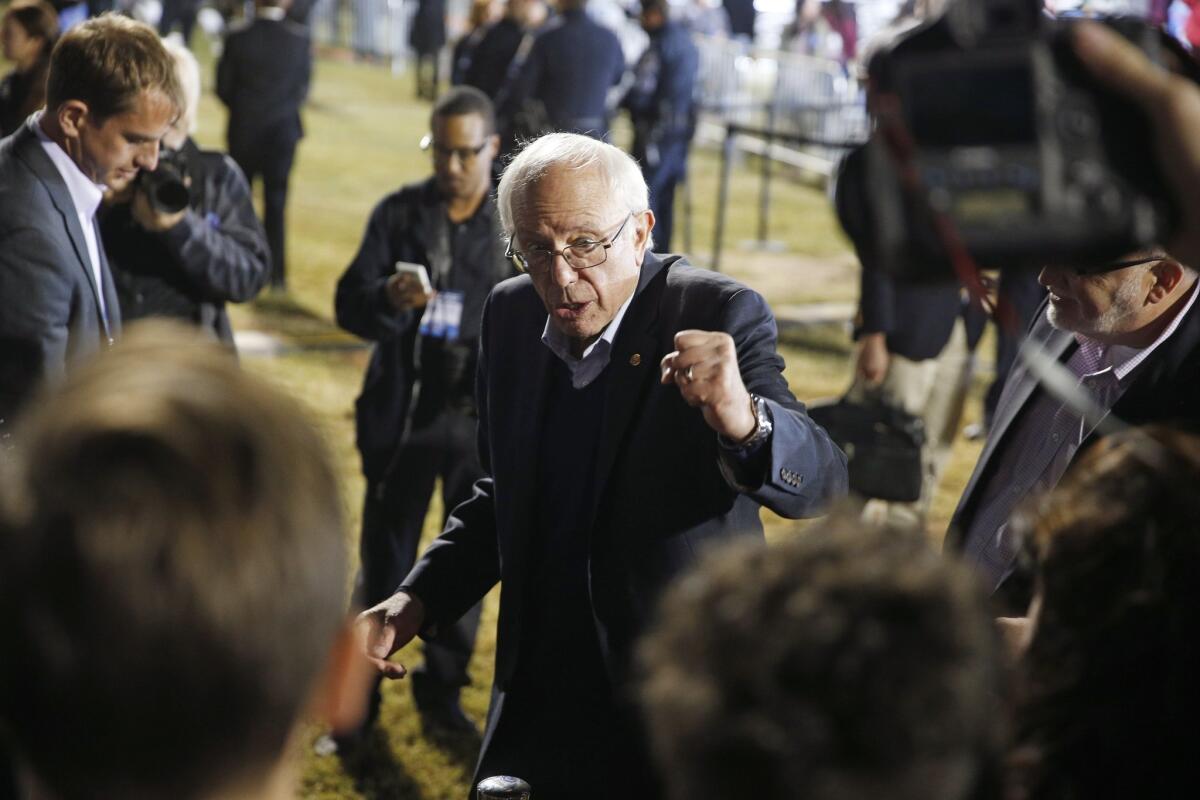Sanders pushes hard for Latino support but faces tough climb against Clinton

Sen. Bernie Sanders campaigns in North Las Vegas. He is seeking to boost his support among Latinos in the state, which holds one of the first contests of the nominating season.
Reporting from Las Vegas — In a Spanish-language radio ad that began airing in Nevada last week, a smooth-voiced announcer introduced a presidential candidate many listeners probably hadn’t heard of.
“Bernie Sanders’ father came to the United States when he was a young man,” the ad said. “‘Immigration’ isn’t just a word for Bernie Sanders. His story is the immigrant story.”
The senator from Vermont is making a major new push to connect with Latino voters, a group he’ll desperately need to best Democratic front-runner Hillary Rodham Clinton in Nevada’s Feb. 20 caucuses and in other Latino-heavy states.
His campaign has hired several prominent “Dreamer” activists — immigrants brought to the country as children — along with Arturo Carmona, a well-known organizer who previously headed the Latino advocacy group Presente.org.
On Sunday, Sanders held a rally in a Latino neighborhood featuring a 10-piece mariachi band. On Monday, at a forum on immigration, he vowed to close privately run immigrant detention centers and to protect from deportation all immigrants without legal status who have been in the U.S. for at least five years.
He has a tough climb ahead. Clinton, affectionately known to many Latinos here as “La Hillary,” has had staff working Nevada’s precincts since April. Her campaign has 22 paid staffers in Nevada who have been knocking on doors and calling voters daily, asking them to sign cards pledging to back her at the caucus meetings. Sanders opened his first campaign office in Nevada last month.
TRAIL GUIDE: All the latest news on the 2016 presidential campaign >>
“It’s going to be hard for him to win given that he’s setting up his campaign infrastructure this late in the game,” said Andres Ramirez, a political consultant in Las Vegas who specializes in Latino outreach. “It’s going to be hard to overcome the traction she’s already got.”
Another obstacle? Many Latinos still don’t know who Sanders is.
An impreMedia poll released Monday found that 41% of Latinos surveyed in 14 battleground states had never heard of Sanders or had no opinion of him, compared with only 12% unfamiliar with Clinton.
Sixty-one percent of Latinos reported favorable views of Clinton; 39% for Sanders.
“He’s way behind in terms of organizing,” said David Danmore, an analyst with Latino Decisions, the firm that conducted the poll. “And he’s got that extra threshold to get over because he’s so unknown.”
Miguel Juarez, a mechanic who on a recent morning was toiling under the hood of truck in a Latino neighborhood on this city’s east side, said he first learned about Sanders while watching the Democratic debate in October. “He seems honest,” said Juarez, 60. “But I know Clinton better.”
Juarez, who said he has positive memories of Bill Clinton’s presidency, said he planned to vote for her.
Sanders’ backers say he has growing support among young Latinos, especially those who have been politicized by the immigrant rights movement and who are attracted to Sanders’ social justice battle cries.
Jose Rivera, a 22-year-old student at the University of Nevada Las Vegas, co-founded a pro-Sanders group on campus and said Latino membership is growing. He and other Latinos meet weekly at the campaign’s headquarters to discuss how to bring their candidate’s message on immigration reform but also campaign finance regulation and economic fairness to the Latino community. Each of those “are Latino issues,” he said.
Sanders faces a third challenger for the Latino vote — former Maryland Gov. Martin O’Malley — who has heavily courted immigrant activists. O’Malley, who spoke at the annual gathering of the Fair Immigration Reform Movement here the day before Sanders, lashed out at Clinton and Sanders for what he criticized as their cautious records on immigration. His opponents came to support pro-immigrant policies only after “poll-tested triangulation,” he said as he touted his own accomplishments, including the Maryland Dream Act, which allows immigrants who are in the U.S. illegally and who meet certain conditions to pay resident tuition at state universities.
“Anyone can talk about it, but we actually did it,” O’Malley said.
But the candidate to beat is still Clinton, who is mounting the type of shoe-leather campaign here that no one else can afford.
On a recent afternoon, Natalie Montelongo, a Clinton campaign organizer who spent part of her childhood in Mexico, briskly walked through a residential neighborhood in east Las Vegas, clipboard in hand. She knocked on door after door, asking the mostly Latino residents whether they planned to vote for Clinton.
Fermin Vera, 55, was on the fence.
“She doesn’t offer us anything different,” he complained in Spanish. And he didn’t like the fact that Clinton, while secretary of State, had conducted some official business using a private email account. He had heard of Sanders, but said he didn’t know much about him.
“I want you to think about something,” Montelongo said. “We’re the only campaign out here knocking on doors, taking the time to get to know you, to see what you think, to listen to what you need.”
She walked away smiling. After a 15-minute conversation, Vera had signed his name to a card pledging to vote for Clinton.
For more on Campaign 2016, follow @KateLinthicum
MORE IN POLITICS
In Republican debate, moderators will be in the spotlight
Jeb Bush: No mercy for baby Hitler
Trump calls for Starbucks boycott at raucous Springfield rally
More to Read
Get the L.A. Times Politics newsletter
Deeply reported insights into legislation, politics and policy from Sacramento, Washington and beyond. In your inbox three times per week.
You may occasionally receive promotional content from the Los Angeles Times.











